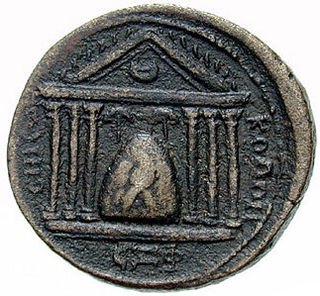An omphalos is a religious stone artifact, or baetylus. In Ancient Greek, the word ὀμφᾰλός means "navel". Among the Ancient Greeks, it was a widespread belief that Delphi was the center of the world. According to the myths regarding the founding of the Delphic Oracle, Zeus, in his attempt to locate the center of the earth, launched two eagles from the two ends of the world, and the eagles, starting simultaneously and flying at equal speed, crossed their paths above the area of Delphi, and so was the place where Zeus placed the stone. Omphalos is also the name of the stone given to Cronus. In the ancient world of the Mediterranean, it was a powerful religious symbol. Omphalos Syndrome refers to the belief that a place of geopolitical power and currency is the most important place in the world.

A temple is a building reserved for spiritual rituals and activities such as prayer and sacrifice. The term typically used for such buildings belonging to all faiths where a more specific term such as church, mosque or synagogue is not generally used in English. These include Hinduism, Buddhism, Sikhism and Jainism among religions with many modern followers, as well as other ancient religions such as Ancient Egyptian religion.
Messenger, Messengers, The Messenger or The Messengers may refer to:
Sin is an act of transgression against divine law.

Traditionally an oath is either a statement of fact or a promise with wording relating to something considered sacred as a sign of verity. A common legal substitute for those who conscientiously object to making sacred oaths is to give an affirmation instead. Nowadays, even when there is no notion of sanctity involved, certain promises said out loud in ceremonial or juridical purpose are referred to as oaths. "To swear" is a verb used to describe the taking of an oath, to making a solemn vow.

Yazidism or Sharfadin is a monotheistic ethnic religion that has roots in a western Iranic pre-Zoroastrian religion directly derived from the Indo-Iranian tradition, although other, less common and more outdated narratives link the religion to Zoroastrianism and even Ancient Mesopotamian Religions. Yezidism is followed by the mainly Kurmanji-speaking Yazidis and is based on belief in one God who created the world and entrusted it into the care of seven Holy Beings, known as Angels. Preeminent among these Angels is Tawûsê Melek, who is the leader of the Angels and who has authority over the world.

Baetylus are sacred stones that were supposedly endowed with life, or gave access to a deity. According to ancient sources, at least some of these objects of worship were meteorites, which were dedicated to the gods or revered as symbols of the gods themselves.
The term City of God may refer to the unity between the Holy Roman Empire and the Roman Catholic Church in the Middle Ages. The term may also refer to:
God-Emperor or God Emperor may refer to:
Precursor or Precursors may refer to:
Sacred fire or holy fire may refer to:
Sacred Games may refer to:
A sacred entity is one endowed with religious significance.

Scarabs were popular amulets and impression seals in ancient Egypt. They survive in large numbers and, through their inscriptions and typology, they are an important source of information for archaeologists and historians of the ancient world. They also represent a significant body of ancient art.
Herbs are used in many religions – such as in Christianity and in the partially Christianized Anglo-Saxon pagan Nine Herbs Charm. In Hinduism a form of basil called tulsi is worshipped as a goddess for its medicinal value since the Vedic times. Many Hindus have a Tulsi plant in front of their houses.
This page is based on this
Wikipedia article Text is available under the
CC BY-SA 4.0 license; additional terms may apply.
Images, videos and audio are available under their respective licenses.




